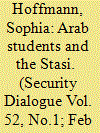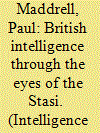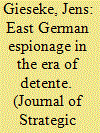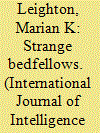| Srl | Item |
| 1 |
ID:
178184


|
|
|
|
|
| Summary/Abstract |
In the early 1980s, the East German Ministry for State Security systematically recruited Arab students as covert informers. Analysis of this historical case contributes to discussions about surveillance as a social practice and to an emerging critical literature about intelligence agencies as knowledge producers and agents of governance. Proceeding from a close reading of archives documenting the recruitment process, I argue that it produced, first, classic modern bureaucratic security mechanisms designed to govern populations and, second, highly specific sovereign interventions into the lives of single individuals. By focusing primarily on the agents of surveillance, rather than its objects, the article addresses an important gap in the surveillance literature.
|
|
|
|
|
|
|
|
|
|
|
|
|
|
|
|
| 2 |
ID:
111182


|
|
|
|
|
| Publication |
2012.
|
| Summary/Abstract |
The German parliament's Law on the Stasi Records, passed in 1991, extended the principle of freedom of information to the records of a Communist security service. By so doing, it has given historians, former targets of Stasi intelligence collection and others an unprecedented insight into the operations of such a service. Enough records of the Stasi's trials department have been made available to reconstruct a picture of the work of British intelligence agencies in the years 1945-61, and above all the work of the Secret Intelligence Service (SIS). They show that SIS was a very skilful service which obtained the high-grade intelligence it sought. However, SIS's work in East Germany was undone in the late 1950s by the treason of the KGB's penetration agent in it, George Blake.
|
|
|
|
|
|
|
|
|
|
|
|
|
|
|
|
| 3 |
ID:
082241


|
|
|
|
|
| Publication |
2008.
|
| Summary/Abstract |
East Germany was one of the main actors in Cold War military and security policy intelligence. Due to the opening of the archives of the Ministry for State Security (Stasi) of the German Democratic Republic it is possible today to analyse methods and goals of the East German civil and military intelligence services on this field in more detail. The article summarises the state of research on staff and sources of these services. Based on this information, main directions and operational fields are exemplified for military and international strategic intelligence in the era of d tente of the 1970s. Contents and quality of intelligence results are focused with respect to their potential influence on East German and Warsaw Pact (i.e. Soviet) decision-making processes.
|
|
|
|
|
|
|
|
|
|
|
|
|
|
|
|
| 4 |
ID:
134895


|
|
|
|
|
| Summary/Abstract |
A massive fortress-like structure dominating Normannenstrasse in East Berlin housed the headquarters of the East German Ministry for State Security (MfS), better known as the Stasi. It was a monument to the tasteless architecture of the Stalinist era. Passersby instinctively recoiled at the sight of the building. They could readily imagine the warren of cellblocks, interrogation rooms, and torture chambers deep inside its walls. Rumor had it that many of the cells were padded with burlap to muffle the screams of the torture victims, as well as to prevent prisoners from committing suicide by banging their heads to a bloody pulp against the concrete walls. The passersby also knew that an overzealous Stasi operative could emerge without warning to arrest and indict them for alleged crimes against the regime. Such “snoop and snatch” tactics were all part of a day's work for the MfS.
|
|
|
|
|
|
|
|
|
|
|
|
|
|
|
|